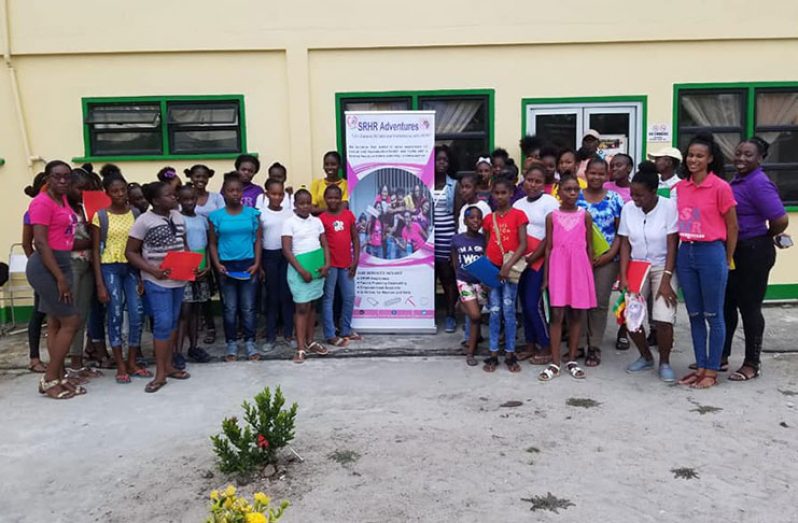Aimed at empowering and educating adolescent girls within communities
THE Buxton Health Centre was converted into a new and dynamic club as members of the Sexual and Reproductive Health and Rights (SRHR) group embarked on the establishment of a new project, “The Parushi Club”, which is seeking to transform the lives of girls into dynamic young women.

The programme which commenced at 14:30hres at the health centre had 57 persons in attendance, 40 of whom were girls within the adolescent ages.
‘Parushi’ is the Akawaio word for ladies and the club was founded by SRHR to carry out mentorship and awareness programmes that seek to engage young women within the ages of 10 to 19 from the Buxton/Friendship community and surrounding villages. Further, it aims to teach adolescent females about their bodies, while enhancing awareness of sexual and reproductive health and rights.
Ramona Chanderballi, Motivational speaker of the SRHR stated that
Sexual and Reproductive Health and Rights (SRHR) is the concept of human rights that are applied to sexuality and reproduction. It is a combination of four fields that in some contexts are more or less distinct from each other, but less so or not at all in other contexts.
“The troubling rate of unwanted pregnancies, adolescent pregnancies and domestic violence are social ill that continue to plague the regions of Guyana. Thus, through this programme young ladies will be motivated by self-awareness sessions. These sessions will be facilitated by community resource individuals, government agencies and members of the SRHR Adventures team,” she explained.

The project will last for three months, ending in May 2019, with sessions being held every Saturday and Sunday. At the same time a method of random sampling will be used to select female adolescents from the community.
Project Justification
President of SRHR, Dr. Patricee Douglas, told the Pepperpot Magazine that in today’s society a project of such nature is a vital one, since it seeks not only to impart knowledge into the lives of young ladies concerning their reproductive health and other important aspects that exists in life, but also serves to enhance their abilities to make wise decisions about such, all while building skills, supporting each other and adding value to their community.
It is well known, she said, that gaining knowledge can change our lives, and this is exactly what this project sets out to do, change and empower the lives of thirty young ladies residing in the village of Ann’s Grove, which is one that has a significant rate of adolescent pregnancy.
She added that with such a project the issue of empowerment will be dealt with at the foundational level by educating, bringing awareness and highlighting better life choices to the young ladies, which would benefit them in the long run.
Women’s role
“Often times the powerful role women can play in dealing with environmental issues such as climate change are often ignored. But it is our belief that by investing in educating our girls about their sexual and reproductive health more specifically the use of contraceptives and family planning to avoid unwanted and unplanned pregnancy can have a positive impact on climate change.
“From several studies conducted it was seen that population growth is tied to climate change, and Braun 2009 stated in his article that ‘Family planning should be seen as one of the primary methods of emission reductions.’ He went on to further explain that, ‘Total emissions depend on the number of emitters as well as their individual carbon tonnage,’ This part of the solution is so easy and so cheap and would bring other social and economic benefits from health and education to the empowerment of women. It would also ease all other environmental problems we face-the rapid shrinkage of soil, fresh water, forests, fisheries, wildlife, oil reserves and the looming food crisis,” Dr. Douglas disclosed.
She enlightened that research from the London School of Economics stated that contraception is almost five (5) times cheaper as a means of preventing climate change than conventional green technologies (Lancet, 2009). Adding that no longer should the fact that SRH is a very important aspect of the lives of women be ignored.
Invest in our girls – save our planet
“Instead we should be smart and invest in our girls’ education about their sexual and reproductive health, and they will in turn make wiser decisions that may just save our planet, since the decisions of our girls about family formation in terms of size and spacing of such will influence future population growth rates and affect the health and welfare of families. Therefore, we must keep in mind that education and family planning are two human rights that of tremendous importance to life, especially that of women and our girls, and this may just be a key in leading Guyana towards a sustainable and green economy,” Dr. Douglas urged.
Deliverables and outcomes
Essentially, the SRHR project is aimed at ensuring that girls and young women are taught about their bodies and their sexual and reproductive systems. At the same time it is also directed at improving the knowledge of continuum of care in maternal and newborn child health of girls and young women.
With these aims as part of the SRHR’s agenda, they are also looking at the improvement of the knowledge, skills and attitudes towards money and financial decision-making of girls; while teaching the girls and young women to be able to look after themselves and others for whom they are responsible, such as friends and their family.
It is expected that coming out of what was imparted to the girls and young women of the Parushi Club, there will be increased contraception knowledge of by participants; delayed first pregnancies and prevention of second pregnancies in all participants by getting all sexually active members on birth control before the programme ends. Also, there will be an increase in self-awareness and self-esteem in all participants, Dr. Douglas posited.


.jpg)











